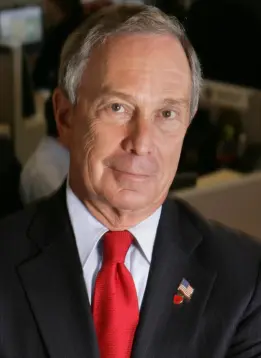I’ve been telling myself during this primary season that “it’ll be okay.” That the primaries are always generally a little more radical early on to appeal to the bases of each party, but ultimately candidates come back to the center in order to have a more moderate appeal in the general election. I really believe this is important not just because of the necessity to win independent votes in the general election, but most importantly because becoming more moderate strikes a conciliatory tone that can unite the country. Unfortunately, both political parties don’t seem to be moving this direction, making the opportunity for a 3rd option candidate potentially the most significant in many elections.
For the GOP, less than a week until the first Iowa primary finds us with Donald Trump continuing to extend his lead, now capturing 41% of GOP support according to recent polls, with his nearest competitor Cruz capturing just 19%. The sensible candidate, Jeb Bush, is being crushed. A great opinion piece by David Axelrod describes a theory that I believe is evident on both sides;
Open-seat presidential elections are shaped by perceptions of the style and personality of the outgoing incumbent. Voters rarely seek the replica of what they have. They almost always seek the remedy, the candidate who has the personal qualities the public finds lacking in the departing executive.
Poor Jeb Bush seems to share these qualities, and the loudest parts of the GOP have little interest in supporting a candidate that bares any resemblance to President Obama. At the same time, the style of Trump and Cruz are polar opposite to that of Obama, a possible explanation for their continued success and high polling in the face of (amazingly) open opposition from the GOP establishment (e.g. the now infamous National Review piece “Against Trump”). Normally I’d chuckle at the state of the GOP, as I believe spending the Obama Presidency scaring the sh*t out of their base to (successfully) gain majorities in the House and Senate has given birth to the dire predicament the party finds itself in now. Ironically, the most important “taking back” tagline leading up to Iowa is the GOP establishment “taking back” their party from the fringe who have thoroughly hijacked it during this primary season.
I said I’d normally chuckle, but the Democrats don’t seem to be moving in a more moderate direction either. While, in the context of David Axelrod’s theory, the GOP is looking for the opposite of Obama as a man, the Democrats seem to be looking for someone politically left of Obama (the same guy who pursued health care reform, presided over the legalization of gay rights, and has publicly spoken about climate change). While Hillary Clinton seems to be the common sense candidate, the Democratic primaries have seen the emergence of democratic socialist Bernie Sanders who has pushed the party even further to the left. Combined with what I believe is an uneasiness with the establishment version of a Democrat (e.g. coziness with big banks), Clinton has had to double down on more progressive policies to try and unite a left wing that sees an opportunity with Sanders to compromise less and do more. Certainly not as dire as the GOP situation, but the narrative still has been driven further from the center instead of toward it.
 If both parties seem to be moving away from center instead of towards it, who can unite the country in a general election? The answer might be a legitimate 3rd party candidacy not seen since Ross Perot. Who specifically? Michael Bloomberg. Bloomberg is interesting as he already has name recognition, has deep pockets to properly support his own candidacy, and has been outspoken on issues that both sides of the aisle can get behind. The right would love his economics, and the left would love his social policies (pro-choice, pro gay-rights, pro gun control). If we reach the general election with the Democrats and the GOP each producing their more radical candidates, each bruised and battered from a primary season that may have pushed them further left or right of sensibility, then the opportunity might be there for a uniting 3rd party candidate that can capture the support of independents as well as the disenfranchised establishments of both parties.
If both parties seem to be moving away from center instead of towards it, who can unite the country in a general election? The answer might be a legitimate 3rd party candidacy not seen since Ross Perot. Who specifically? Michael Bloomberg. Bloomberg is interesting as he already has name recognition, has deep pockets to properly support his own candidacy, and has been outspoken on issues that both sides of the aisle can get behind. The right would love his economics, and the left would love his social policies (pro-choice, pro gay-rights, pro gun control). If we reach the general election with the Democrats and the GOP each producing their more radical candidates, each bruised and battered from a primary season that may have pushed them further left or right of sensibility, then the opportunity might be there for a uniting 3rd party candidate that can capture the support of independents as well as the disenfranchised establishments of both parties.